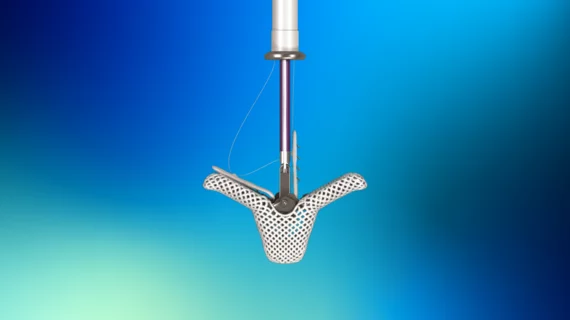FDA approves Abbott’s TriClip TEER device for tricuspid regurgitation
Abbott has received approval from the U.S. Food and Drug Administration (FDA) for its TriClip transcatheter edge-to-edge repair (TEER) system designed to treat tricuspid regurgitation (TR). TriClip is delivered through a vein in the patient’s leg, repairing the tricuspid valve by clipping together flaps of tissue using the same technology found in Abbott’s MitraClip device.
The approval comes less than two months after the FDA’s Circulatory System Devices Panel voted in favor of the device by a count of 13 to 1. The agency based its decision primarily on data from the TRILUMINATE trial, which included 350 patients randomized to either undergo TEER with TriClip or guideline-directed medical therapy.
Overall, the TRILUMINATE study’s primary endpoint—a hierarchical composite that included all-cause mortality, tricuspid valve surgery, heart failure hospitalization and quality of life (QOL) improvements after one year—favored treatment with the TEER device. However, there were no significant differences when it came to all-cause mortality/tricuspid valve surgery or heart failure hospitalizations. The primary difference was related to QOL improvements as measured by the Kansas City Cardiomyopathy Questionnaire (KCCQ).
In terms of safety, 98% of patients were free from major adverse events after 30 days.
“This approval helps address a treatment gap for people with tricuspid regurgitation who previously had few options to treat a disease that adversely impacted their daily lives and could lead to other deadly conditions,” Sandra Lesenfants, senior vice president of Abbott's structural heart business, said in a statement. “With the addition of TriClip to our broad structural heart therapy offerings in the U.S., we are continuing to bring meaningful, life-enhancing benefits to patients with cardiovascular conditions.”
“The U.S. approval of TriClip is a significant advancement for people suffering from tricuspid regurgitation, a heart condition that negatively impacts their quality of life and puts them at grave risk of serious health issues,” added Paul Sorajja, MD, TRILUMINATE co-principal investigator and director of the Center for Valve and Structural Heart Disease for the Minneapolis Heart Institute at Abbott Northwestern Hospital. “With TriClip, physicians can offer patients a therapy option backed by excellent safety and effectiveness to help restore tricuspid native valve performance without subjecting them to high-risk open-heart surgery that may not be feasible for individuals with TR who are generally older and sicker.”
The TriClip TEER system gained CE mark approval back in 2021.
As many cardiologists in the field expected, 2024 has been a busy year for tricuspid valve care. Edwards made history in February when the FDA approved its Evoque transcatheter tricuspid valve replacement device for TR.

